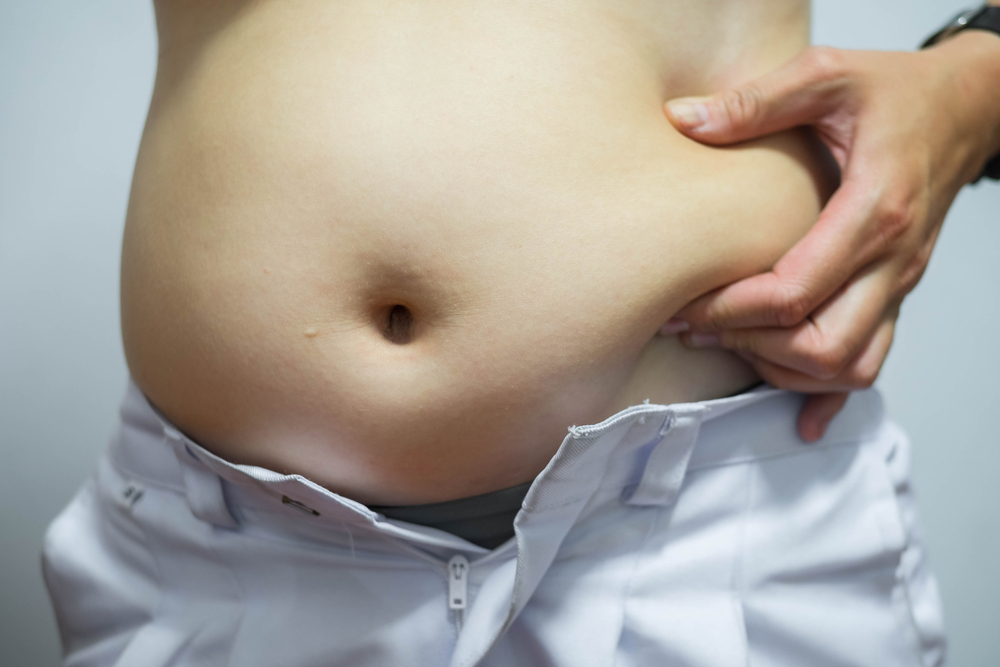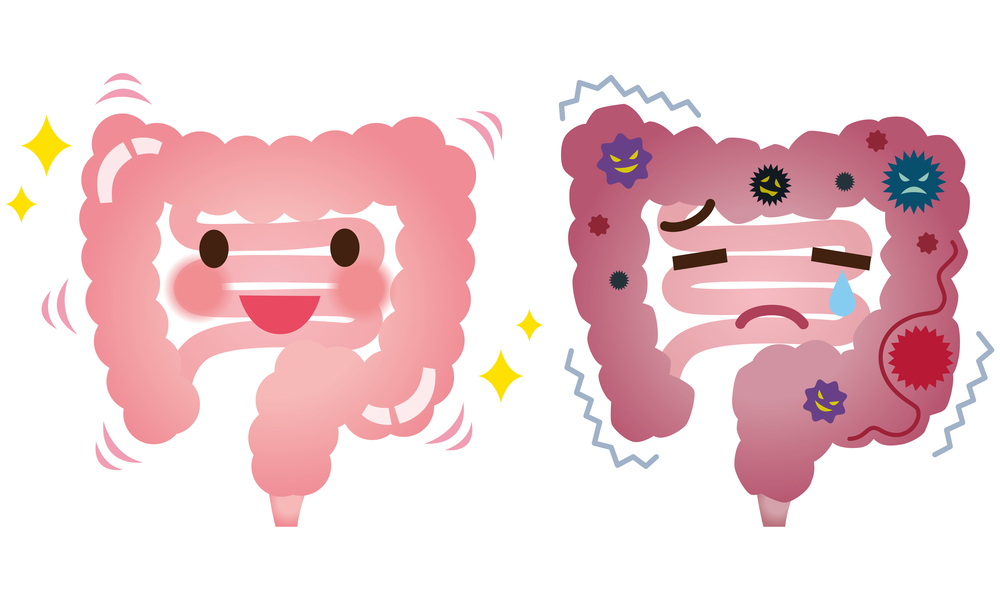Belly Up – Tackling Belly Bloat During Midlife and Beyond


Carrie Pierce has worked exclusively in the Health, Beauty and…
Sometimes, a reader submits an Ask Carrie question that’s so compelling, it’s just too good and/or too important to not address publicly. And in depth in article format.
That’s exactly what happened last month, when a reader wrote in with the following question, hot on the heels of my earlier 2-part article ‘Going, Going, Gone- Bowel Health, Beauty and You’.
The reader wrote in with the following:
‘Speaking of bowel health, what are your thoughts about belly fat? I am pretty thin all over except my belly. In the morning it’s pretty normal but by mid morning it’s huge and I just hate it. No amount of exercise really works. I read all these things you can drink to get rid of it but are they safe?
Signed Frustrated 60 year old in Ohio…’
She then wrote the following addendum to her question: ‘By the way, I’ve already gone through Menopause in my 40s…’
Well, Ms. Frustrated, this one’s for you – and any other woman out there going through the exact same frustration! (That’s pretty much ALL of us, by the way…)
I too, miss my skinny jeans actually buttoning. I also really miss my hipbones – and wonder, ‘will I ever see them again… without a horrible illness intervening and making my weight plummet??’
Here’s the scoop: There’s a difference between Belly Fat and Belly Bloat and it’s a big one. Fat ain’t usually the issue, though certainly can be a symptom.
In a nutshell there are myriad causes of post-Menopausal belly bloat. Here are some of the more common, though most often overlooked: hormone imbalance, adrenal fatigue and/or adrenal exhaustion, electrolyte imbalances and the water retention they cause, food and environmental allergies, IBS/constipation/diarrhea/malabsorption issues, fibroids, possible ovarian-uterine cancer, heredity, certain medications, sluggish liver and toxic buildup-especially after Menopause, thyroid issues, high carb diets/excess sugar intake/alcohol consumption.
Do any of these surprise you?
Properly identifying the real cause of Midlife Belly Bloat isn’t an easy thing!
So, if Ms. Frustrated had been my client, first off, I would ask her the following:
- When you say ‘by midmorning it’s huge…’ Just how huge is Huge?
- Are there abdominal feelings of fullness or pressure? Any feelings of heaviness down your legs when this belly bloat occurs? How about across your lower back?
- Have you had any spotting since achieving Menopause officially?
- Also, when you went through Menopause at age 40 was that medically/surgically induced Menopause, or was that a natural cessation of your periods? (40 is pretty young to have completed the Menopause process naturally. If it was a naturally occurring event, is this an age when most of the females in your family reach Menopause?)
- How is your bone health these days?
Yes, I know… I’m nosy! What in the world could these questions have to do with belly bloat?!?
Turns out, a lot.
What’s important for us all to remember is, the female body continues to cycle hormonally from cradle to grave. Even if you no longer have menstrual periods, your body is cycling, cycling, cycling!
Even Menopausal, it’s still quite common for women to end up being estrogen dominant. This can cause bloating issues just like it did in your younger, PMS-y, Midol-filled days. But when we talk Hormone Imbalance, there’s A LOT more to it then just the basic Estrogen/Progesterone stuff. There’s also Testosterone/Cortisol/DHEA/Leptin and many others- all with important roles to play within the body- and they can- and will- contribute to Belly Bloat if not maintained in happy balance.
Water retention can occur, exacerbated by the rather high possibility that adrenal insufficiency is contributing to ongoing water retention by means of electrolyte imbalance -particularly potassium-sodium imbalance.
Estrogen dominance can also make fibroids an issue, though after Menopause it’s thought most fibroids shrivel and die on their own due to declining estrogen levels. Family history has a big role to play in this.
Do you have fibroids? If so, don’t expect a flat abdomen, especially if these buggers are medium to large in size!
It would also be wise to rule out Ovarian or Uterine cancer, especially if spotting has occurred after having gone 12 months with no period. (This is where the heavy feeling in the legs, across the lower back and in the abdomen comes into play.) Any family history?
I’ve mentioned Adrenal Fatigue a few times and it’s a biggie.
By the time we get to Midlife, most of us have been through the wringer; life traumas, the death of loved ones, divorce, loss of job-home-income, Empty Nest syndrome, moves, family strife, illnesses, toxic relationships… you name it, we all have been hit by one -or more- or all of these issues and they take their toll!
As the body moves into Menopause, the adrenals are the B Team. They kick in with mild, reserve estrogen to make up for the ovaries that are shutting down. Or at least that’s how it’s supposed to work.
Enter Menopause with weakened adrenals and you enter at your own peril!
If the adrenal glands are exhausted, they aren’t going to be able to pick up the slack. This then sets up a cycle of exhaustion, hormone imbalance, thyroid issues, electrolyte imbalance, increased fat development -especially around the stomach, hips and thighs- and water retention.
Usually food and digestive sensitivities crop up around this time too because the entire body is out of kilter. Ongoing adrenal fatigue also causes breakdown of the supportive collagen and muscle structures of the body. Once muscle declines – fat follows and sets up shop. Fun, huh?!?
We then waste years lurching through life bloated, weak, haggard, flatulent, sweating, wired and tired and very, very miserable… Happy Days….
Now, so far, I’ve touched on the hormone imbalance component of Belly Bloat. There’s a lot of other stuff to consider:
- How’s your Day In, Day Out diet? (If you aren’t sure, try keeping a food diary for a month.)
- Are you drinking alcohol and/or smoking regularly? Are you eating a carbohydrate-heavy diet or are you making sure to get enough quality protein?
- Are you eating enough of the quality fats or are you hampering your metabolism with low fat eating?
- Do you consume artificial sweeteners?
- Do you drink a lot of caffeine or energy drinks?
- Are you getting enough daily fiber?
- How’s your elimination? Are you regular? Are your stools showing evidence of colonic buildup? Are they small and thin? Dark and strong smelling? (IBS and other digestive issues and sensitivities often hit after Menopause because our gut biome alters with ongoing and worsening hormonal shifts. This can make us gassy and bloated and can also contribute to sluggish digestion and colonic buildup.)
- Are you staying properly hydrated?
- Do you have food sensitivities? (Think grains/gluten/dairy/nuts/sugars)
- Are you taking any medications for Lipid issues? Hormonal issues? Cardiovascular issues? Diabetes issues?
- How is your liver functioning? (Toxic buildup in the body can more easily occur after Menopause because the body cleansed itself regularly through the act of menstruation. Once that process ceases to take place, toxins can more easily accrue. If the liver is sluggish, bloat follows, and is usually seen in the midsection.)
- How’s your blood sugar?
So, as you can see, it’s MUCH more than just a quick fix when it comes to identifying and conquering Belly Bloat – and it’s absolutely imperative that these potential conditions and issues be considered when mapping out a strategy to bust the ‘fat’.
And as for those nifty drinks out there being sold to all us Bloated Middle Aged Damsels in Distress: most are made up of herbal laxatives and diuretics. They don’t burn fat– they just flush out superficial poop and water, which can make us feel and look temporarily lighter. Some are better than others but Caution should be the watchword!
If you consume these drinks and do nothing else, you could end up worse off in that electrolyte imbalances can be worsened. Too, they will do nothing to address underlying hormone imbalance issues. Some of them do contain detoxifying herbs but BUYER BEWARE.
So, Ms. Frustrated, my best advice to you -and to all of us- is: if you find yourself bloating around your midsection – or have developed a Muffin Top that closely resembles a Brioche, think well beyond just getting your jeans zipped again! Hightail it to your Naturopath and/or MD and have some tests run.
Find out where you stand hormonally -and in general- and also if you have any sensitivities or allergies that might be exacerbating things.
If and when all checks out A OK, start making sure you get quality sleep every night, feed yourself well, stay properly hydrated with quality water, eat enough of the right kinds of fats, eliminate artificial sweeteners, cut back on carbs and get some good, gentle movement in your daily life: walks, dancing, yoga… and get a quality fiber supplement eased into your daily life as well. Cut back on the stress and just love who and what you are, Here and Now.
Not everyone is blessed with a Midlife, but you have been… not everyone makes it this far down Life’s Tenuous Path… Think about that the next time your stomach jiggles. And smile.
Thanks for writing in with your excellent question! I hope I’ve been able to help!
Copyright 2018 Carrie E. Pierce all rights reserved
Author: Carrie Pierce
Carrie Pierce has worked exclusively in the Health, Beauty and Entertainment industries for over 30 years. She’s a Licensed Aesthetician, Certified Color Analyst, former Hollywood Film and TV Makeup Artist, syndicated Radio Talk Show Host and a published Author, specializing in Midlife Health and Beauty issues. It’s Carrie’s mission -and her passion- to help make Midlife the very best it can be- for women and men everywhere!

Carrie Pierce has worked exclusively in the Health, Beauty and Entertainment industries for over 30 years. She’s a Licensed Aesthetician, Certified Color Analyst, former Hollywood Film and TV Makeup Artist, syndicated Radio Talk Show Host and a published Author, specializing in Midlife Health and Beauty issues. It’s Carrie’s mission -and her passion- to help make Midlife the very best it can be- for women and men everywhere!




Hi Carrie,
It’s Jan, I read you article and am still puzzled and really concerned about my recent weight gain.
I had an emergency appendectomy on May 18th and in 2 1/2 months since then I’ve gained 12 lbs. I’m not eating any differently so needless to say, I’m now seriously concerned/worried. I agree that I do need to walk and exercise more but gaining 12 lbs in this short amount of time is puzzling, any suggestions? Is it possibly usual for a woman to gain weight after an emergency appendectomy at 60 + years old?
Hi Jan- Thanks so much for trusting me enough to write in with your question! Bless your heart.
First and foremost, I need to state for the record: I am NOT a Doctor- but can and will- attempt to address your concerns from a layman’s perspective only.
With that said, an emergency Appendectomy is no simple thing!
Weight gain is actually quite common with this procedure it seems- and there can be many reasons for this:
First of all with most emergency appendectomies, there can be the potential for infection spreading to surrounding tissues. Because of this, this type of surgery can also involve a bit of exploratory snooping, to make sure the other parts of the abdominal cavity are still healthy and are uninvolved.
This means moving things around a bit, filling the patient with air and/or saline to help ease the surgeon’s efforts while viewing surrounding tissues and organs.
Did they take an ovary or anything else during the surgery? If so, this might account for weight gain through resultant hormonal imbalance.
Anesthesia, pain meds and IV drips can also cause weight gain due to constipation and water retention issues.
Too, one gets rather a thorough ‘clean out’ during this type of surgery, so elimination cycles can be interrupted for quite some time- causing weight gain through lack of elimination.
This usually begins to resolve itself once regular elimination begins again.
Do you -or DID you- have a lot of swelling after your surgery? If so, this will cause you to retain fluid and that will show up on the scale as ‘weight gain’ even though it’s only fluid weight gain and should resolve itself once the body is sufficiently healed.
The body activates its full healing brilliance during this kind of trauma and that usually involves lymphatic fluid and other fluids racing to the site of the wound, addressing the injury and bathing it in cellular healing substances for repair. Fluid has weight.
Now on to a more possible ‘nuanced’ cause: Given the earlier mentioned ‘clean out’ that can occur during this type of surgery (think poop and bowel stuff) the potential is always there after this type of procedure to have the bacterial balance within the gut (the all-important gut microbiome) get woefully out of balance. This can cause weight gain, hormonal imbalance and ongoing bowel issues like constipation and/or IBS symptoms.
My best advice to you is this: give your healing process another month or so and in the meantime walk, gently stretch and make sure your diet is as nourishing and healthy as possible. If, after another month, your weight doesn’t begin to go down and/or stabilize, go see your MD/ND and discuss having your hormones tested along with post surgery bloodwork.
And, if you aren’t clear as to what all was actually done during this surgery, ask detailed questions!
Being that it was an emergency procedure- perhaps in the heat of the moment- things were done that you possibly don’t recall or aren’t clear about. A detail that’s missing might explain your present situation.
I wish you deep healing My Friend! And I hope this info helps you!